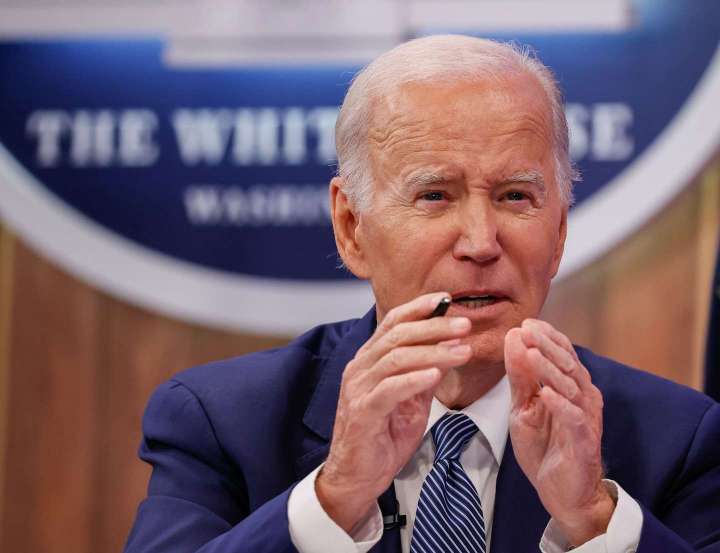As banks and international financial organizations warned of the possibility of a global recession, President Biden said he does not foresee one in the United States, but he acknowledged the prospect of a minor downturn.
Biden concedes risk of ‘slight’ U.S. recession as IMF issues warning

Biden’s take came as the International Monetary Fund, a global lender, downgraded its outlook for the world economy and warned of “storm clouds” gathering — among them “persistent” inflation, the fallout from the Ukraine war and a slowdown in China’s property market impacting the global economy.
The chief executive of JPMorgan Chase, Jamie Dimon, also told CNBC this week that the United States is likely to tip into recession “six to nine months from now,” despite at the moment “actually still doing well.” He added: “This is serious stuff.”
A recession is technically defined as two quarters, or six months, of negative economic growth. However, the National Bureau of Economic Research, the official arbiter of U.S. recessions, looks for other signs such as “significant” and widespread declines across the economy, including in the employment rate, consumer spending and other factors.
Biden, however, said financial experts often throw around predictions. “Every six months they say this,” he said, but it “hadn’t happened yet.”
“We’re in a better position than any other major country in the world — economically and politically,” he continued. “We still have real problems,” he added, but he said recent legislation such as the nearly $2 trillion American Rescue Plan and Inflation Reduction Act has accomplished a lot.
As international head winds continue to weigh on the world economy, the 190-member IMF forecast that global growth would slow from 6 percent in 2021 to 3.2 percent in 2022 and 2.7 percent in 2023 — the weakest growth since 2001, it said Tuesday, except for the global financial crisis and the acute phase of the coronavirus pandemic.
“The three largest economies, the United States, China and the euro area, will continue to stall,” Pierre-Olivier Gourinchas, the IMF’s chief economist, told reporters. “In short, the worst is yet to come, and for many people, 2023 will feel like a recession.”
Gourinchas said that countries accounting for a third of world output are expected to “contract” this year or next. In the United States, he tweeted, rising interest rates could slow growth to 1 percent in 2023 down from 1.6 percent this year.
Globally, he wrote, “inflation remains the most immediate threat to current and future prosperity by squeezing real incomes & undermining macro stability.” He urged central banks around the world to “keep a steady hand with monetary policy firmly focused on taming inflation.”
This morning, I presented our analysis of the global economy. Russia’s war in Ukraine, the cost-of-living crisis & slowdown in China are the primary reasons we are downgrading growth to 3.2% in 2022 & 2.7% in 2023. https://t.co/rV7PnlIg55 (1/5) pic.twitter.com/XZLSWB5jq6
— Pierre-Olivier Gourinchas (@pogourinchas) October 11, 2022
Biden said he knows that families are worried about the rising cost of energy and medications and are looking for “breathing room,” with the economy set to be a major focus of the upcoming midterm elections.
White press secretary Karine Jean-Pierre said Wednesday that the president’s comments in Tuesday’s interview did not mark a change in outlook.
“We take this unique global economic moment very seriously,” Jean-Pierre said. “And the president wants the American people to know that because of America’s resilience and because of the president’s economic plan that we have seen throughout the [past] 20 months, we are in a stronger position than any other country to navigate these global challenges that we’re seeing in front of us.”
U.S. job growth slowed again in September, a sign that the labor market may be cooling from its red-hot peak earlier this year, even though it remains an area of strength for a U.S. economy bracing for a downturn. The Federal Reserve has also hiked interest rates five times since March, moving at an aggressive pace to curb inflation and balance the economy. Nevertheless, some financial experts warn that a recession and financial pain are in store for American families and businesses.
As the war in Ukraine rumbles into its eighth month, the decision by a coalition of oil-producing nations led by Russia and Saudi Arabia last week to slash oil production by 2 million barrels per day, in a rebuke to Biden, has also deepened fears of a global recession. The White House said Tuesday that Biden is reevaluating the U.S. relationship with Saudi Arabia following the OPEC Plus announcement.






